- Home
- Raymond Benson
High Time To Kill Page 10
High Time To Kill Read online
Page 10
Bond wanted to snap at her but took a deep breath instead. “Ma’am, Ms. Hollander has unshakable connections with immigration here. We would know if they had left by plane or train.”
“What about by car?” she asked. “They could get in a car and drive right out of Belgium and no one would know.”
The conversation ended badly. Bond promised to do his best to find Harding, and M said something to the effect that his best wasn’t enough. After he rang off, he threw a glass of whisky against the wall.
Things hadn’t improved in the morning. He got up feeling as if his body had been the target of a battering ram.
The doctor spoke in French to Gina. Bond understood him perfectly. He had a cracked rib.
“I see no damage to your kidneys other than bruising,” the doctor told him in English. “If you notice blood in your urine, then of course you must come in for more tests.”
The doctor wrapped Bond’s chest in a tight harness and told him to wear it for at least a week. It had Velcro straps, so he could take it on and off for bathing, but he should certainly wear it to bed.
As they left the clinic, Gina led him to her own car, a red Citroën ZX. “We’ll go and see that doctor now,” she said. She moved the everpresent toothpick from one side of her mouth to the other. “I checked him out. Dr. Hendrik Lindenbeek is a cardiologist, and from what I gather, a good one.”
Bond was silent in the car as they drove southeast. Away from the central historical section, Brussels became like any other modern European city. Vestiges of the old world disappeared and were replaced by late-twentieth-century architecture, shopping malls, office buildings, and elegant town homes. Franklin Roosevelt Avenue might have been Park Lane in London.
“Don’t worry,” Gina said, uncomfortable with Bond’s sullen mood. “We’ll find him. My gut tells me he hasn’t left Brussels.”
“My gut tells me that I should leave this ghastly business and take early retirement,” Bond said bitterly.
“Come now. Surely this isn’t the first time something has gone wrong for you?”
“No, it isn’t. It’s just that sometimes I wonder why I bother. In the old days, the enemy was clear cut. Communism was a worldwide threat and we were motivated by ideology. Today it’s different. I feel as if I’ve become a glorified policeman. There must be a better way to die.”
“Stop it,” she said, her voice stern. “You do your best. What else is there? Everyone has his or her limit.”
“I’ve been to my limit. Many times.”
“James,” she said. “There will come a time, probably very soon, when you will push yourself past your limit. When that happens, you will come to terms with your life and this job of yours.”
Bond was too weary to argue.
“What you need is an evening out,” she said brightly. “A good Belgian dinner, some drinks … How about it?”
Bond looked sideways at her. “Are you asking me for a date?”
She grinned in her pixielike way. “Is that all right? Providing we are free tonight, of course.”
Bond allowed himself a smile. “Sure.”
They arrived at their destination and she parked in front of Dr. Lindenbeek’s building. They got out, pressed the intercom button, and explained that they were “police.” A nurse met them at the door and said that Dr. Lindenbeek was with a patient.
“We’ll wait,” Gina said in Flemish. She showed the woman her credentials and they were led into the austere waiting room.
“It shouldn’t be long,” the nurse said, then left them alone. They could hear a man’s voice speaking softly through the wall. After a few minutes, an elderly woman emerged, followed by the doctor. He said good-bye to her in French, then turned to Gina and Bond.
Gina spoke in Flemish, explaining that they were from the government and wanted to ask him some questions. Immediately, Bond knew that the man was involved. Lindenbeek’s eyes widened and he swallowed hard.
“Come in,” he said in English, gesturing toward his office.
Bond asked, “Dr. Lindenbeek, do you recall making a sketch that looks like this?” He took a pen from the doctor’s desk and drew a torso on the prescription pad. When he outlined the pacemaker position, Dr. Lindenbeek slumped back in his chair and held his head in his hands.
“Well?” Bond asked.
“Am I under arrest?” he asked.
“Not yet. But it will help if you tell us everything.”
“I must keep my patients confidentiality …” he muttered.
Bond perceived that this man was merely a pawn. Perhaps if he scared him a bit, he would open up.
“Dr. Lindenbeek,” Bond said. “We’re here on a serious matter of espionage. I can assure you that if you don’t cooperate with us, then you will be under arrest. Espionage is a major crime. It can carry the death penalty. At the very least, you would lose your licence to practice medicine. Now, are you going to talk to us, or are we going to have to take you to the police?”
The doctor almost whimpered. “Yes, I performed the operation. I was forced to.”
“Why don’t you start at the beginning,” Gina suggested. The toothpick went from one side of her mouth to the other.
Again Lindenbeek hesitated.
Bond added, “Dr. Lindenbeek, you could also be in serious danger. The people you’re dealing with are quite ruthless. They’re killers.”
Lindenbeek poured a glass of water from a pitcher on his desk. He offered some to his visitors, but they shook their heads.
“If I tell you everything, can you guarantee me protection?” he asked.
“Perhaps,” Bond said. “It depends on how much you tell us and how helpful it is.”
The doctor nodded and began to speak. “Five … no, six months ago, I got into a little trouble. There was a patient, a woman. I’m not married, and sometimes it is difficult for me to meet women. I was attracted to a patient and I may have gone too far. She certainly encouraged me, though. It was, how do you say, mutual?”
“Consensual,” Bond said.
“Yes. But somehow photographs were taken of us, here in this examination room. I had been set up. Afterward, this woman filed charges against me for rape and malpractice. The truth is that she is a member of something called the Union.”
He looked at Bond and Gina for a sign of recognition when he mentioned the name.
Bond nodded and said, “Go on.”
“You know of them?”
“Yes. Please continue, doctor.”
The doctor seemed relieved. “Thank God. I was afraid you would think I was crazy. This Union, they contacted me and said they could make this malpractice suit go away if I did something for them. At the time, I was defiant and thought I could prove in court that the woman wasn’t raped. Then they did something horrible. I began to receive photographs in the mail—child pornography. The packets would come two or three times a week. I burned them, but the Union got in touch with me again and said that I was now on some kind of list of child molesters. If I didn’t help them with a service, they would make sure that I was arrested and charged with dealing in that filth.”
“How did they contact you?” Bond asked.
“Always by phone. Some Frenchman. It was a local exchange, I’m pretty sure.”
“Then what happened?” Gina asked.
“What could I do? I agreed to help them,” he said. Lindenbeek was sweating and his hands were shaking as he poured himself another glass of water.
“What did they want you to do?”
“I was told that a Chinese man, Mr. Lee Ming, would come to see me. He was in his late fifties and actually needed the pacemaker. His heart rhythm went up and down. I was told to schedule an operation at Erasme for this man. I was to obtain a pacemaker and have everything ready. The night before the operation, I was told that an Englishman would visit me and deliver what they called a microdot. It would be on a piece of film. I was to put this microdot inside the pacemaker before performing the operation. As
it seemed harmless, I did it.”
“When was this?”
“The operation was two days ago.”
“Can we see Mr. Lee’s file?” Gina asked.
At first Lindenbeek hesitated, but then he nodded. “It’s right here. He handed it over. Bond examined it, but there wasn’t much there. “Lee Ming” could very well be an alias. The patient’s address was listed as the Pullman Astoria Hotel.
“Did they ever tell you what was on the microdot?”
Lindenbeek shook his head. “I didn’t want to know.”
Bond believed him. The man was too scared to lie.
“Do you know where Mr. Lee is now?” Bond asked.
Lindenbeek shrugged his shoulders. “I don’t know. He’s a Chinese citizen visiting this country. The Englishman asked how soon Mr. Lee would be able to travel. I assumed that he was going back to China.”
“And you’re sure that the people who wanted this done called themselves the Union?”
“Yes.”
Bond stood up. “Right. Dr. Lindenbeek, I think it would be best if you come with us. We’ll want to interrogate you in more detail and show you some mug shots. This is for your own safety. If the Union are indeed behind this, and they learn that you’ve talked, you could be a dead man.”
“I’m under arrest?”
Gina nodded. “It’s better that way, doctor. You’ll be safer. We’ll take you to the police station downtown. Once we get this sorted out, we can move you somewhere else. We will need you for a trial if and when we catch the people responsible for this.”
“You mean … testify?”
Bond nodded. “You’re the only one who can prove that our man, Harding, gave you this microdot.”
“He told me his name was Donald Peters.”
“He lied. Come on, doctor. Better cancel the rest of your appointments today. Let’s go.”
Hendrik Lindenbeek was taken to the police station at Rue Marché au Charbon, a more than fifty-year-old dark brown brick building. The Brussels authorities had been contacted by the Ministry of Defence and were now aware of the situation. Lindenbeek would be held pending a hearing that would take place the next day at the Palais de Justice. A public prosecutor had been assigned to consider espionage charges against Steven Harding and Lee Ming, and an allpoints alert had been issued for their arrest. Extraditing the suspects would be another matter altogether, as Belgium would hold its own hearings on whether or not they could indeed be sent to England. Bond figured that they would hold on to Lindenbeek, as he was a Belgian citizen. A Chinese national would probably be sent back home. Harding, however, was English, and belonged back in the UK.
Bond and Gina spent the afternoon at the police station and saw that Lindenbeek was put in a cell alone. Inspector Opsomer assured them that they would be contacted as soon as he heard something. Belgium’s state security force, the Securité d’État, was taking charge of the investigation. From then on, there was nothing more that could be done.
Before leaving the station, Gina phoned the Pullman Astoria Hotel and learned that Lee Ming had checked out.
Although they had caught a big fish, Bond felt frustrated. He knew M wouldn’t be completely happy, either.
They went back to the Métropole. Gina collapsed in an armchair while Bond sat at the desk to phone London. After the ritualistic security checks, he was put through to his chief.
“Double-O Seven?”
“Yes, ma’am.”
“How are you feeling? I heard about your injuries,” she said. Her concern sounded genuine.
“I’ll live, ma’am. Just a cracked rib and some bruises.”
“I dare say you’ve survived much worse.”
“I’m afraid I don’t have much to report. Dr. Lindenbeek is in custody and the matter is being handled by the Securité d’État. We’re out of the loop as far as he is concerned.”
“That’s all right, as long as the Belgians hold on to him. For the time being anyway. No leads regarding Harding or this Chinese man?”
“None. They could very well still be in Brussels. Then again …”
“I understand. Double-O Seven, I want you to continue your work with Station B for at least another day. If nothing turns up, come back to England. I’m afraid I’ll have to give the Minister news he’s not going to like.”
Bond could hear the disappointment in her voice. He had let her down. “Ms. Hollander and I are going to go through Interpol files tomorrow and try to determine who Lee Ming really is. He looked familiar somehow.”
“Fine. We’ll talk tomorrow.”
Bond hung up and said nothing. Gina picked up on Bond’s gloom and said, “Hey, remember what I said you needed tonight? Come on, let’s go have dinner. The restaurant downstairs is fabulous. Change your clothes or do whatever it is you Brits do to get ready for an evening out with a gorgeous, fun-loving Belgian girl.”
They met again in the hotel’s luxurious bar, Le 19ème, which was laid out in the style of a gentleman’s club, with Corinthian columns and deep leather chairs.
She was dressed in a low-cut, short black cocktail dress that revealed more of her legs than Bond had previously seen. The single pearl on her necklace dangled teasingly at the top of her pronounced cleavage. Her eyes sparkled.
“You look good enough to eat,” Bond said.
“So do you,” she said, taking his arm. He was dressed in a tailormade Brioni dinner suit.
L’Alban Chambon is considered one of Belgium’s finest restaurants. It is tastefully designed with wood floors, white walls, and intricately carved blue molding. There are mirrors on two sides of the room, creating the illusion that the room is much larger than it really is. The head-waiter showed Bond and Gina to a small round table covered by a white tablecloth on top of a blue one.
As they sat, a tall man wearing a chef’s hat approached them.
“Monsieur Bond?” he asked.
“Dominique!” Bond said. He shook hands with the chef de cuisine. “How good to see you again. This is my colleague, Gina Hollander. Gina, this is one of Europe’s best chefs, Dominique Michou.”
She spoke to him in French. “Pleased to meet you.” Mr. Michou kissed her hand, then said, “I would like you to try our featured special tonight.”
“We’d be delighted.”
“Splendid. I’ll turn you over to Frederick, then. Enjoy your meal.” Michou bowed and returned to the kitchen. Frederick, the headwaiter, presented them with menus and a wine list. Bond ordered a full-bodied red wine, Château Magdaleine Bouhou.
New Age solo piano music was playing softly over the sound system. A plaintive, high-pitched male voice began to improvise lyrics over the music. Gina closed her eyes and smiled.
“You know this music?” Bond asked.
She nodded. “It’s a Belgian composer named Wim Mertens. He’s contemporary and does some beautiful things. I find his music very sad at times.”
Bond shrugged. “If I have any taste in music at all, it’s for jazz and big band. Ever hear of the Ink Spots?”
“I don’t think so.”
When the wine came, Bond toasted Gina and they drank together. Then he asked, “Gina, what is your cover?”
“I beg your pardon?”
“Do you use a cover? In the old days when MI6 was known as Universal Exports, and later Transworld Consortium, I traveled the world as an importer/exporter. What do you tell people when they ask you what you do?”
“My memoir in college was in fashion design,” she said. “I really am a designer, so that’s what I say. I’m partners with a friend of mine from school. She owns a dress shop in Brussels. We design things together.”
“You look the part, then.”
“Thank you. And what do you tell people now that MI6 is no longer an ‘importer/exporter’?”
Bond smiled wryly. “Usually I say I’m a civil servant. That tends to shut them up right away.”
A waiter brought them salade d’asperges à l’oeuf sur le plat et crè
me d’estragon, which was made of tender white and green Belgian asparagus with a poached egg on top and creamy tarragon sauce on the side.
“You’re not like other Brits,” she said after a while.
“Oh?”
“We have always seen Brits as very serious and easily shocked. Except for the ones who come over and booze it up for a weekend.”
“I am neither,” Bond said.
“No! You like your alcohol, but it does not seem like you would be easily shocked. Another way I’ve always thought of British men is that they are ‘real’ gentlemen. You are a gentleman.”
“Flattery will get you everywhere.”
“What do you think of Belgian women?” she asked, licking a bit of sauce from the corner of her mouth. Bond realized that this was the first time he had seen her without a toothpick in her mouth.
“Are you a typical Belgian woman?”
She laughed. “I don’t think so. I’m not sure we can be classified, since Belgium is such a multilingual country. The French girls in the south are a little different from the Flemish girls in the north, and so on. We are perhaps not as wild and sexy as Dutch girls.”
“You’re not? Bloody hell …”
That made her laugh. “I mean, we’re as sexually open as any other European girls, I suppose, we just don’t talk about it. It depends on the level of education, I think. Am I making sense?”
“You’re saying that actions speak louder than words?”
She knew he was teasing her. “I had better be careful,” she said, wagging her finger at him. “My English is not so good. You will twist my words and make me say something I’ll be sorry for later!”
The main courses came. She was having filet de boeuf poêlé, légumes de saison frits, et sauce choron—sauteed fillet of beef with fried vegetables and choron sauce. He tried the chef’s special, médallion de veau de lait et risotto aux légumes et parmesan—fillet of milk-fed veal and rice with vegetables and Parmesan cheese. The rice was packed in the shape of a hockey puck with potatoes mixed in.
“This is delicious,” she said, taking a dainty bite of beef.
“Monsieur Michou does it again,” Bond said. The veal was light and tender, cooked a perfect medium so that the pink center was juicy and succulent.

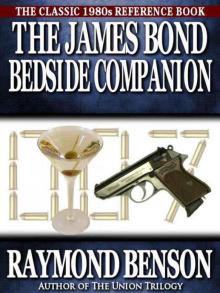 The James Bond Bedside Companion
The James Bond Bedside Companion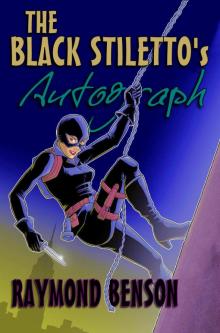 The Black Stiletto's Autograph
The Black Stiletto's Autograph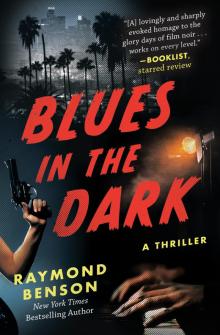 Blues in the Dark
Blues in the Dark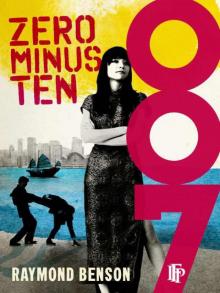 Zero Minus Ten
Zero Minus Ten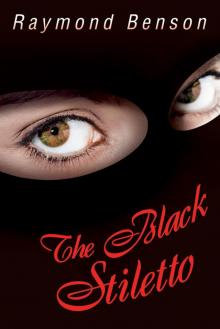 The Black Stiletto
The Black Stiletto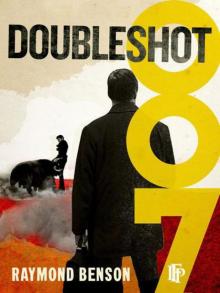 Doubleshot
Doubleshot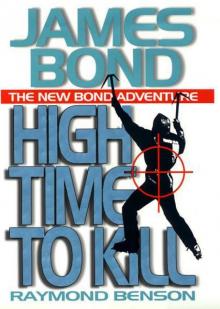 High Time To Kill rbb-3
High Time To Kill rbb-3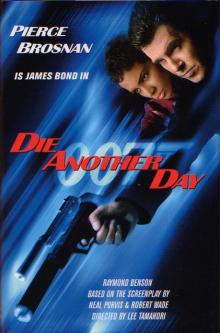 Bond Movies 07 - Die Another Day
Bond Movies 07 - Die Another Day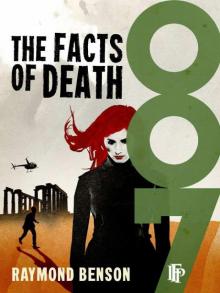 The Facts Of Death
The Facts Of Death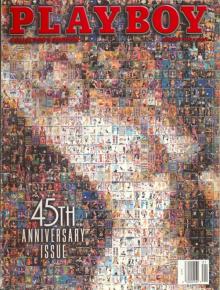 Midsummer Night's Doom
Midsummer Night's Doom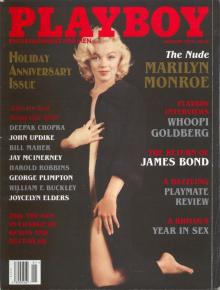 Blast from the Past
Blast from the Past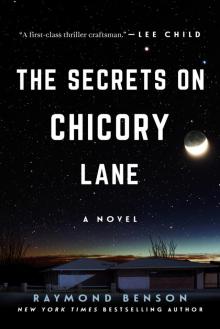 The Secrets on Chicory Lane
The Secrets on Chicory Lane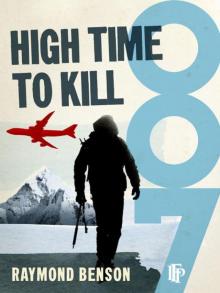 High Time To Kill
High Time To Kill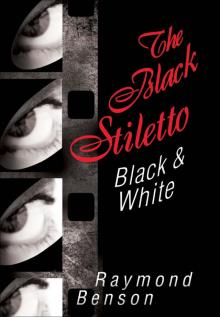 The Black Stiletto: Black & White
The Black Stiletto: Black & White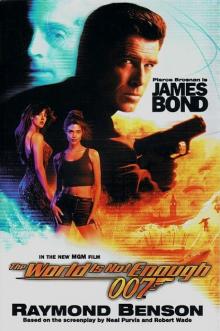 The World Is Not Enough jb-1
The World Is Not Enough jb-1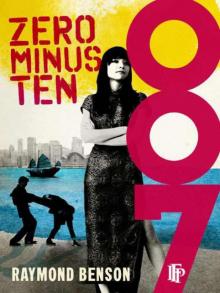 Zero Minus Ten rbb-1
Zero Minus Ten rbb-1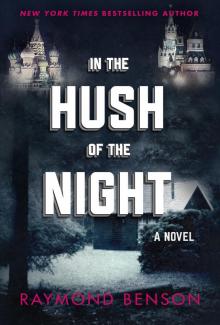 In the Hush of the Night
In the Hush of the Night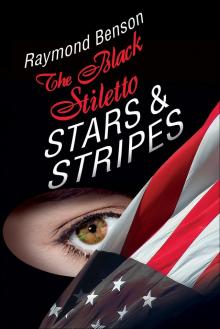 The Black Stiletto: Stars & Stripes
The Black Stiletto: Stars & Stripes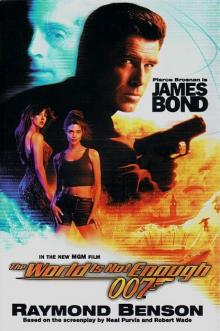 Bond Movies 06 - The World Is Not Enough
Bond Movies 06 - The World Is Not Enough The Rock 'n Roll Detective's Greatest Hits - A Spike Berenger Anthology
The Rock 'n Roll Detective's Greatest Hits - A Spike Berenger Anthology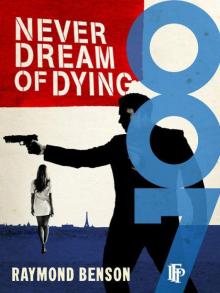 Never Dream Of Dying
Never Dream Of Dying